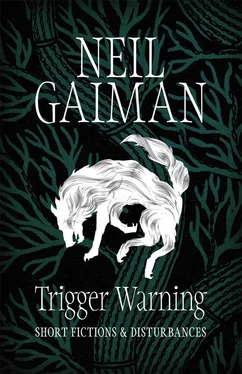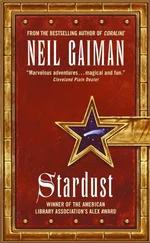Neil Gaiman - Trigger Warning - Short Fictions and Disturbances
Здесь есть возможность читать онлайн «Neil Gaiman - Trigger Warning - Short Fictions and Disturbances» весь текст электронной книги совершенно бесплатно (целиком полную версию без сокращений). В некоторых случаях можно слушать аудио, скачать через торрент в формате fb2 и присутствует краткое содержание. Год выпуска: 2015, Издательство: Headline, Жанр: Старинная литература, на английском языке. Описание произведения, (предисловие) а так же отзывы посетителей доступны на портале библиотеки ЛибКат.
- Название:Trigger Warning: Short Fictions and Disturbances
- Автор:
- Издательство:Headline
- Жанр:
- Год:2015
- ISBN:нет данных
- Рейтинг книги:4 / 5. Голосов: 1
-
Избранное:Добавить в избранное
- Отзывы:
-
Ваша оценка:
- 80
- 1
- 2
- 3
- 4
- 5
Trigger Warning: Short Fictions and Disturbances: краткое содержание, описание и аннотация
Предлагаем к чтению аннотацию, описание, краткое содержание или предисловие (зависит от того, что написал сам автор книги «Trigger Warning: Short Fictions and Disturbances»). Если вы не нашли необходимую информацию о книге — напишите в комментариях, мы постараемся отыскать её.
Trigger Warning: Short Fictions and Disturbances — читать онлайн бесплатно полную книгу (весь текст) целиком
Ниже представлен текст книги, разбитый по страницам. Система сохранения места последней прочитанной страницы, позволяет с удобством читать онлайн бесплатно книгу «Trigger Warning: Short Fictions and Disturbances», без необходимости каждый раз заново искать на чём Вы остановились. Поставьте закладку, и сможете в любой момент перейти на страницу, на которой закончили чтение.
Интервал:
Закладка:
I wrote Stuart’s name on my exercise books.
I did not tell my friends the most important thing about Stuart: that I had made him up.
And now I’m getting up off the bed and looking down at the outline of a man, a silhouette in flour or ash or dust on the black satin bedspread, and I am getting into my clothes.
The photographs on the wall are fading, too. I didn’t expect that. I wonder what will be left of his world in a few hours, wonder if I should have left well enough alone, a masturbatory fantasy, something reassuring and comforting. He would have gone through his life without ever really touching anyone, just a picture and a painting and a half-memory for a handful of people who barely ever thought of him any more.
I leave the flat. There are still people at the wine bar downstairs. They are sitting at the table, in the corner, where Stuart and I had been sitting earlier. The candle has burned way down but I imagine that it could almost be us. A man and a woman, in conversation. And soon enough, they will get up from their table and walk away, and the candle will be snuffed and the lights turned off and that will be that for another night.
I hail a taxi. Climb in. For a moment – for, I hope, the last time – I find myself missing Stuart Innes.
Then I sit back in the seat of the taxi, and I let him go. I hope I can afford the taxi fare and find myself wondering whether there will be a cheque in my bag in the morning, or just another blank sheet of paper. Then, more satisfied than not, I close my eyes, and I wait to be home.
Down to a Sunless Sea
The Thames is a filthy beast: it winds through London like a blindworm, or a sea serpent. All the rivers flow into it, the Fleet and the Tyburn and the Neckinger, carrying all the filth and scum and waste, the bodies of cats and dogs and the bones of sheep and pigs down into the brown water of the Thames, which carries them east into the estuary and from there into the North Sea and oblivion.
It is raining in London. The rain washes the dirt into the gutters, and it swells streams into rivers, rivers into powerful things. The rain is a noisy thing, splashing and pattering and rattling the rooftops. If it is clean water as it falls from the skies it only needs to touch London to become dirt, to stir dust and make it mud.
Nobody drinks it, neither the rainwater nor the river water. They make jokes about Thames water killing you instantly, and it is not true. There are mudlarks who will dive deep for thrown pennies, then come up again, spout the river water, shiver and hold up their coins. They do not die, of course, or not of that, although there are no mudlarks over fifteen years of age.
The woman does not appear to care about the rain.
She walks the Rotherhithe docks, as she has done for years, for decades: nobody knows how many years, because nobody cares. She walks the docks, or she stares out to sea. She examines the ships, as they bob at anchor. She must do something, to keep body and soul from dissolving their partnership, but none of the folk of the dock have the foggiest idea what this could be.
You take refuge from the deluge beneath a canvas awning put up by a sailmaker. You believe yourself to be alone under there, at first, for she is statue-still and staring out across the water, even though there is nothing to be seen through the curtain of rain. The far side of the Thames has vanished.
And then she sees you. She sees you and she begins to talk, not to you, oh no, but to the grey water that falls from the grey sky into the grey river. She says, ‘My son wanted to be a sailor,’ and you do not know what to reply, or how to reply. You would have to shout to make yourself heard over the roar of the rain, but she talks, and you listen. You discover yourself craning and straining to catch her words.
‘My son wanted to be a sailor.
‘I told him not to go to sea. I’m your mother, I said. The sea won’t love you like I love you, she’s cruel. But he said, Oh Mother, I need to see the world. I need to see the sun rise in the tropics, and watch the Northern Lights dance in the Arctic sky, and most of all I need to make my fortune and then, when it’s made I will come back to you, and build you a house, and you will have servants, and we will dance, Mother, oh how we will dance . . .
‘And what would I do in a fancy house? I told him. You’re a fool with your fine talk. I told him of his father, who never came back from the sea – some said he was dead and lost overboard, while some swore blind they’d seen him running a whorehouse in Amsterdam.
‘It’s all the same. The sea took him.
‘When he was twelve years old, my boy ran away, down to the docks, and he shipped on the first ship he found, to Flores in the Azores, they told me.
‘There’s ships of ill omen. Bad ships. They give them a lick of paint after each disaster, and a new name, to fool the unwary.
‘Sailors are superstitious. The word gets around. This ship was run aground by its captain, on orders of the owners, to defraud the insurers; and then, all mended and as good as new, it gets taken by pirates; and then it takes a shipment of blankets and becomes a plague ship crewed by the dead, and only three men bring it into port in Harwich . . .
‘My son had shipped on a stormcrow ship. It was on the homeward leg of the journey, with him bringing me his wages – for he was too young to have spent them on women and on grog, like his father – that the storm hit.
‘He was the smallest one in the lifeboat.
‘They said they drew lots fairly, but I do not believe it. He was smaller than them. After eight days adrift in the boat, they were so hungry. And if they did draw lots, they cheated.
‘They gnawed his bones clean, one by one, and they gave them to his new mother, the sea. She shed no tears and took them without a word. She’s cruel.
‘Some nights I wish he had not told me the truth. He could have lied.
‘They gave my boy’s bones to the sea, but the ship’s mate – who had known my husband, and known me too, better than my husband thought he did, if truth were told – he kept a bone, as a keepsake.
‘When they got back to land, all of them swearing my boy was lost in the storm that sank the ship, he came in the night, and he told me the truth of it, and he gave me the bone, for the love there had once been between us.
‘I said, you’ve done a bad thing, Jack. That was your son that you’ve eaten.
‘The sea took him too, that night. He walked into her, with his pockets filled with stones, and he kept walking. He’d never learned to swim.
‘And I put the bone on a chain to remember them both by, late at night, when the wind crashes the ocean waves and tumbles them onto the sand, when the wind howls around the houses like a baby crying.’
The rain is easing, and you think she is done, but now, for the first time, she looks at you, and appears to be about to say something. She has pulled something from around her neck, and now she is reaching it out to you.
‘Here,’ she says. Her eyes, when they meet yours, are as brown as the Thames. ‘Would you like to touch it?’
You want to pull it from her neck, to toss it into the river for the mudlarks to find or to lose. But instead you stumble out from under the canvas awning, and the water of the rain runs down your face like someone else’s tears.
‘The Truth is a Cave in the Black Mountains . . .’
You ask me if I can forgive myself? I can forgive myself for many things. For where I left him. For what I did. But I will not forgive myself for the year that I hated my daughter, when I believed her to have run away, perhaps to the city. During that year I forbade her name to be mentioned, and if her name entered my prayers when I prayed, it was to ask that she would one day learn the meaning of what she had done, of the dishonour that she had brought to our family, of the red that ringed her mother’s eyes.
Читать дальшеИнтервал:
Закладка:
Похожие книги на «Trigger Warning: Short Fictions and Disturbances»
Представляем Вашему вниманию похожие книги на «Trigger Warning: Short Fictions and Disturbances» списком для выбора. Мы отобрали схожую по названию и смыслу литературу в надежде предоставить читателям больше вариантов отыскать новые, интересные, ещё непрочитанные произведения.
Обсуждение, отзывы о книге «Trigger Warning: Short Fictions and Disturbances» и просто собственные мнения читателей. Оставьте ваши комментарии, напишите, что Вы думаете о произведении, его смысле или главных героях. Укажите что конкретно понравилось, а что нет, и почему Вы так считаете.







